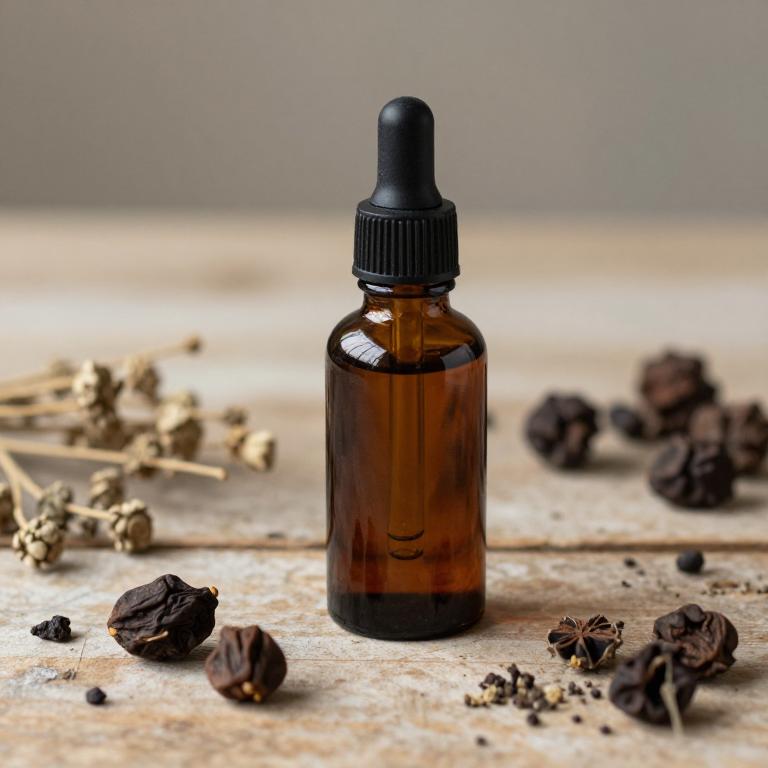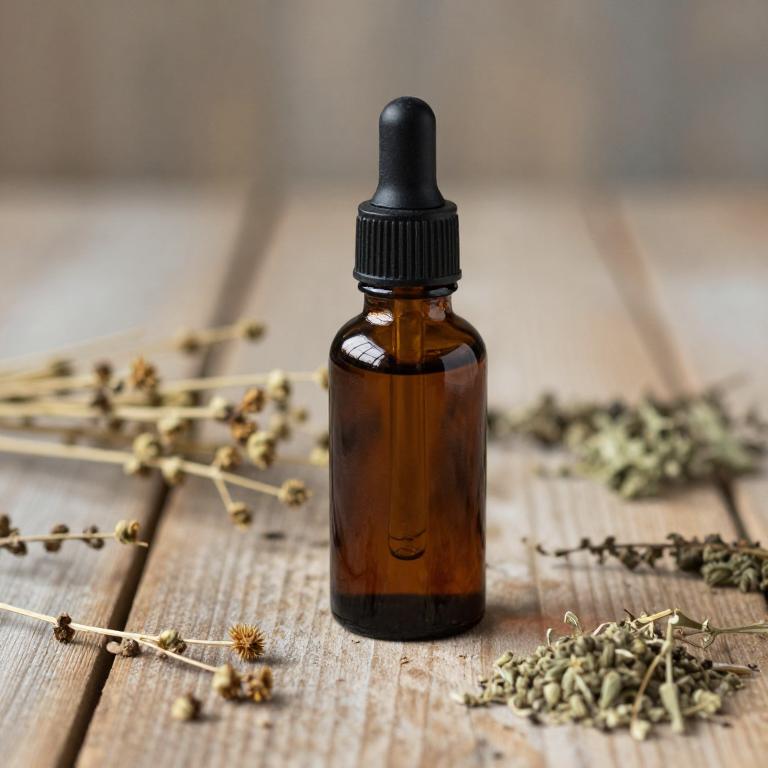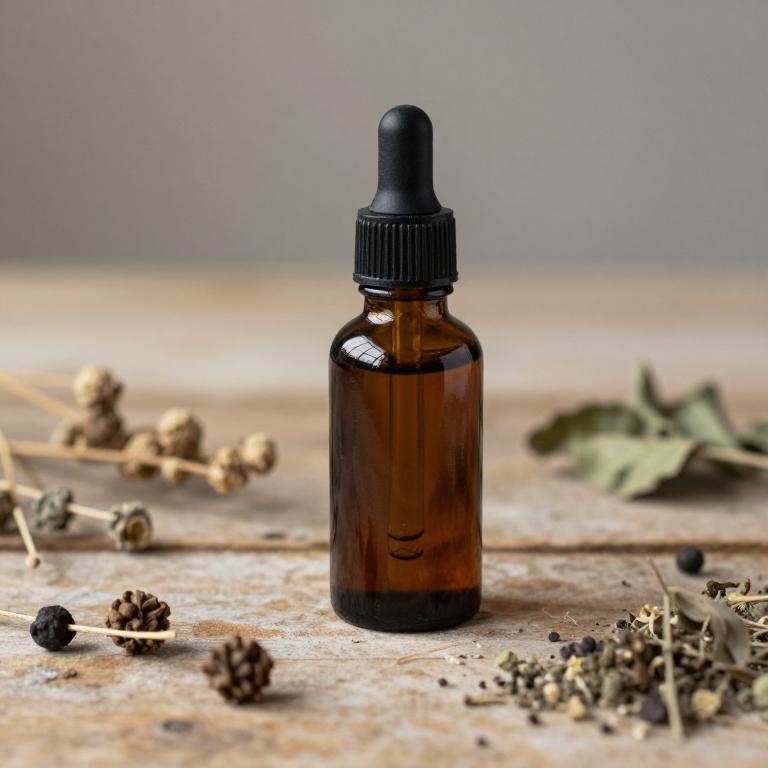10 Best Herbal Tinctures For Mucus In Stomach

Herbal tinctures for mucus in the stomach are concentrated liquid extracts made from various plant-based ingredients known for their soothing and anti-inflammatory properties.
Common herbs used in these tinctures include ginger, licorice root, and marshmallow root, which are traditionally used to calm stomach irritation and reduce excess mucus production. These tinctures work by coating and protecting the lining of the stomach, helping to alleviate symptoms such as nausea, indigestion, and discomfort. They are often preferred over synthetic medications due to their natural composition and fewer side effects.
However, it is important to consult a healthcare professional before using herbal tinctures, especially if you have underlying health conditions or are taking other medications.
Table of Contents
- 1. Fennel (Foeniculum vulgare)
- 2. Black pepper (Piper nigrum)
- 3. Ginger (Zingiber officinale)
- 4. Licorice (Glycyrrhiza glabra)
- 5. Turmeric (Curcuma longa)
- 6. Cumin (Cuminum cyminum)
- 7. Ceylon cinnamon (Cinnamomum verum)
- 8. Peppermint (Mentha piperita)
- 9. Thyme (Thymus vulgaris)
- 10. Thistle (Silybum marianum)
1. Fennel (Foeniculum vulgare)

Foeniculum vulgare, commonly known as fennel, has been traditionally used in herbal medicine for its ability to support digestive health, particularly in reducing mucus buildup in the stomach.
Fennel tinctures are often prepared using the dried seeds of the plant, which are rich in essential oils containing compounds like anethole and limonene. These compounds are believed to have anti-inflammatory and carminative properties that help soothe the digestive tract and reduce excess mucus production. When taken as a tincture, fennel can act as a natural remedy to alleviate symptoms such as bloating, indigestion, and gastric discomfort.
However, it is important to consult with a healthcare professional before use, especially for individuals with existing medical conditions or those taking medications.
2. Black pepper (Piper nigrum)

Piper nigrum, commonly known as black pepper, has been traditionally used in herbal medicine for its potential to support digestive health.
When prepared as a tincture, Piper nigrum may help reduce mucus buildup in the stomach by stimulating the production of digestive enzymes and promoting healthy gastrointestinal function. The active compound, piperine, is believed to enhance the absorption of nutrients and may have anti-inflammatory properties that soothe the stomach lining. However, it is important to consult a healthcare professional before using black pepper tinctures, as they may interact with certain medications or conditions.
While some people find relief from stomach discomfort with Piper nigrum tinctures, individual responses can vary, and more research is needed to fully understand its efficacy for mucus-related digestive issues.
3. Ginger (Zingiber officinale)

Zingiber officinale, commonly known as ginger, has been traditionally used for its medicinal properties, including its ability to alleviate mucus-related discomfort in the stomach.
Ginger tinctures, which are concentrated liquid extracts of the herb, can help reduce excess mucus production and soothe irritation in the gastrointestinal tract. These tinctures are often made by soaking fresh ginger root in alcohol or another solvent to extract its active compounds, such as gingerol and shogaol. Due to its anti-inflammatory and antioxidant properties, ginger tinctures may aid in digestion and provide relief from symptoms like nausea and indigestion.
However, it is important to consult a healthcare professional before using ginger tinctures, especially for individuals with existing medical conditions or those taking medications.
4. Licorice (Glycyrrhiza glabra)

Glycyrrhiza glabra, commonly known as licorice root, has been traditionally used in herbal medicine for its potential benefits in soothing digestive issues, including mucus production in the stomach.
Licorice root tinctures are often prepared by soaking the dried root in alcohol to extract its active compounds, such as glycyrrhizin and flavonoids, which are believed to have anti-inflammatory and demulcent properties. These properties may help reduce irritation and excessive mucus secretion in the stomach lining, making licorice tinctures a popular remedy for conditions like gastritis or acid reflux. However, long-term use of licorice root can lead to side effects such as hypertension and electrolyte imbalances, so it is important to consult a healthcare professional before use.
Despite these considerations, many people find licorice tinctures to be a natural and effective option for managing stomach mucus and promoting digestive comfort.
5. Turmeric (Curcuma longa)

Curcuma longa, commonly known as turmeric, is widely used in herbal medicine for its anti-inflammatory and digestive properties.
Curcuma longa herbal tinctures are often employed to address excess mucus in the stomach, as they contain curcumin, a compound known for its mucolytic and soothing effects. These tinctures can help reduce the production of gastric mucus and support the healing of the stomach lining. They are typically prepared by steeping the dried root in alcohol to extract its active constituents.
However, it is important to consult a healthcare provider before use, especially for individuals with pre-existing medical conditions or those taking other medications.
6. Cumin (Cuminum cyminum)

Cuminum cyminum, commonly known as cumin, has been traditionally used in herbal medicine for its potential benefits in reducing mucus buildup in the stomach.
The essential oils found in cumin seeds, such as limonene and cineole, possess anti-inflammatory and digestive properties that may help soothe the stomach lining and decrease excess mucus production. When prepared as a tincture, cumin can be more easily absorbed into the bloodstream, enhancing its therapeutic effects. However, it is important to consult with a healthcare professional before using cumin tinctures, especially for individuals with existing gastrointestinal conditions or those taking other medications.
While some studies suggest cumin may aid in digestion and reduce mucus, more research is needed to fully understand its efficacy and safety in this context.
7. Ceylon cinnamon (Cinnamomum verum)

Cinnamomum verum, commonly known as true cinnamon, has been traditionally used in herbal medicine for its potential benefits in alleviating mucus-related issues in the stomach.
The essential oils and compounds found in cinnamon, such as cinnamaldehyde and eugenol, possess anti-inflammatory and antimicrobial properties that may help reduce excess mucus production and soothe digestive discomfort. When prepared as a tincture, cinnamon can be diluted in alcohol to create a concentrated form that is easily absorbed into the body. This herbal tincture is often used to support digestion and may help ease symptoms of gastritis or other stomach conditions associated with mucus buildup.
However, it is important to consult a healthcare professional before using cinnamon tinctures, especially for prolonged periods or in combination with other medications.
8. Peppermint (Mentha piperita)

Mentha piperita, commonly known as peppermint, is often used in herbal tinctures to help alleviate symptoms related to excess mucus in the stomach.
These tinctures work by stimulating the digestive system and promoting the movement of gastric juices, which can help break down mucus and reduce its accumulation. Peppermint contains compounds like menthol and other essential oils that have anti-inflammatory and antispasmodic properties, which can soothe irritation in the stomach lining. When taken in appropriate dosages, peppermint tinctures may provide relief from discomfort caused by mucus buildup, although they should be used with caution in individuals with certain medical conditions.
It is advisable to consult a healthcare professional before using peppermint tinctures, especially if you have a history of gastrointestinal issues or are taking other medications.
9. Thyme (Thymus vulgaris)

Thymus vulgaris, commonly known as thyme, is a popular herb used in traditional medicine for its various therapeutic properties.
Thyme tinctures are often prepared using alcohol to extract the essential oils and active compounds, such as thymol and carvacrol, which are known for their antimicrobial and anti-inflammatory effects. These tinctures may help reduce excess mucus production in the stomach by promoting digestive health and reducing irritation. However, it is important to consult a healthcare professional before using thyme tinctures, as they may interact with certain medications or conditions.
While some people find relief from stomach mucus issues with thyme tinctures, they should not replace prescribed treatments without medical guidance.
10. Thistle (Silybum marianum)

Silybum marianum, commonly known as milk thistle, is a herbal remedy often used in the form of tinctures to support liver and digestive health.
While it is primarily known for its hepatoprotective properties, some studies suggest that its active compounds, such as silymarin, may also have a beneficial effect on mucus production in the stomach. The anti-inflammatory and antioxidant properties of silybum marianum tinctures can help reduce irritation and inflammation in the gastrointestinal tract. However, it is important to note that more research is needed to fully understand its efficacy for stomach mucus specifically.
As with any herbal supplement, it should be used under the guidance of a healthcare professional to ensure safety and appropriateness for individual health conditions.